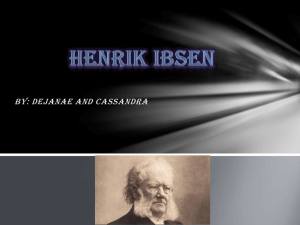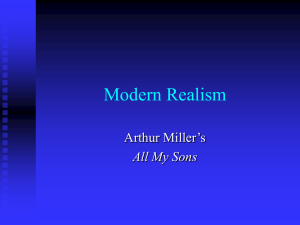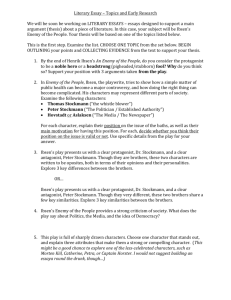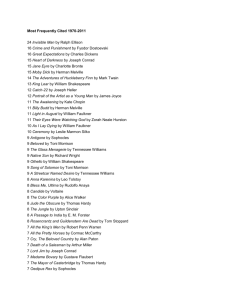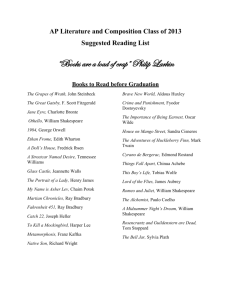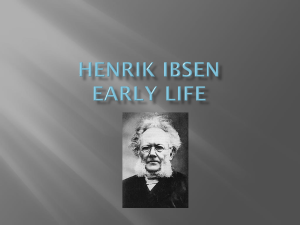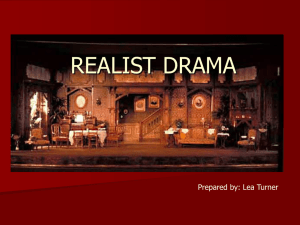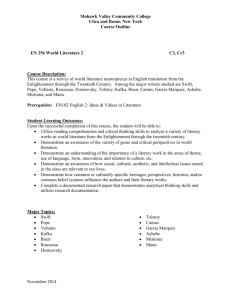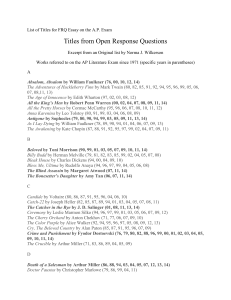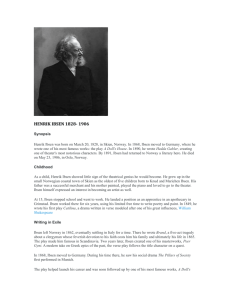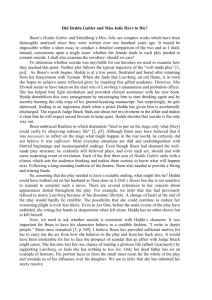IBS4103
advertisement
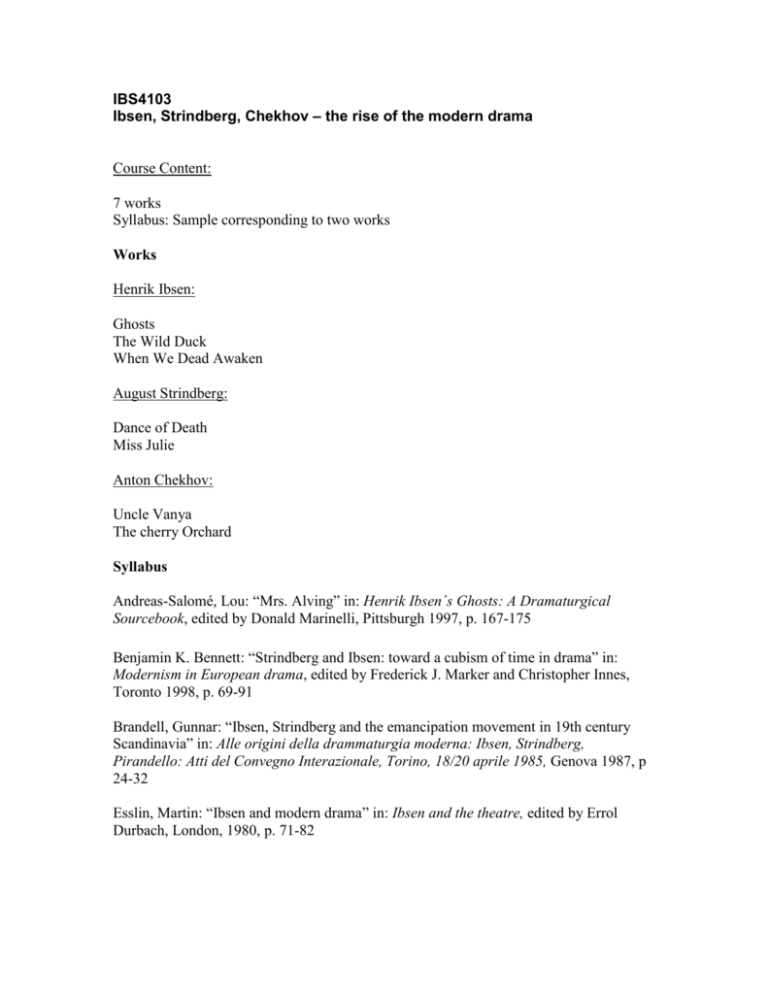
IBS4103 Ibsen, Strindberg, Chekhov – the rise of the modern drama Course Content: 7 works Syllabus: Sample corresponding to two works Works Henrik Ibsen: Ghosts The Wild Duck When We Dead Awaken August Strindberg: Dance of Death Miss Julie Anton Chekhov: Uncle Vanya The cherry Orchard Syllabus Andreas-Salomé, Lou: “Mrs. Alving” in: Henrik Ibsen´s Ghosts: A Dramaturgical Sourcebook, edited by Donald Marinelli, Pittsburgh 1997, p. 167-175 Benjamin K. Bennett: “Strindberg and Ibsen: toward a cubism of time in drama” in: Modernism in European drama, edited by Frederick J. Marker and Christopher Innes, Toronto 1998, p. 69-91 Brandell, Gunnar: “Ibsen, Strindberg and the emancipation movement in 19th century Scandinavia” in: Alle origini della drammaturgia moderna: Ibsen, Strindberg, Pirandello: Atti del Convegno Interazionale, Torino, 18/20 aprile 1985, Genova 1987, p 24-32 Esslin, Martin: “Ibsen and modern drama” in: Ibsen and the theatre, edited by Errol Durbach, London, 1980, p. 71-82 Fergusson, Francis: “The partial perspectives of The modern Theater” and “Ghosts and The Cherry Orchard. The Theater of modern Realism” in: The Idea of a Theater. The Art of Drama in changing Perspective, Garden City 1949, p. 156-190 Gilman, Richard: “Ibsen and the making of modern drama” in: Henrik Ibsen, edited and with an introduction by Harold Bloom, Chelsea House, Philadelphia 1999, p. 87-113 - “Chekhov: Truth, Moral Reality, Imagination” in: Chekhov’s Plays: An Opening into Eternity, New Haven and London 1995, p. 1-35 Heed, Sven-Åke: “Comedy in Ibsen’s contemporary plays: Ghosts” in: Ibsen, Tragedy and the Tragic – Ibsen Conference in Athens 2002, edited by Astrid Sæther, Oslo 2003, p. 149-156 James, Henry: “Henrik Ibsen. I On the occasion of Hedda Gabler; II: On the occasion of The master builder” in: Essays in London and elsewhere, London 1893, p. 241-264 Shideler, Ross: “The patriarchal prison in Hedda Gabler and Dödsdansen” in: Fin(s) de siècle in Scandinavian perspective: studies in honor of Harald S. Naess: Studies in Scandinavian literature and culture, edited by Faith Ingwersen and Mary Kay Norseng, Columbia 1993, p. 78-90 Stanton-Ife, Anne-Marie: “Identity, suicide and tragedy in Hedda Gabler” in: International Ibsen Conference (9: 2000: Bergen): Proceedings, Øvre Ervik 2001, p. 239-247 Steiner, George: The Death of Tragedy, Chapt. VII and VIII, London 1961, p. 284-302 and 303-350 Sæther, Astrid: “The concept of action in Ibsen and Chekhov” in: Norge-Russland 2004/2005: norsk-russiske forbindelser i perioden 1814-1917: rapport fra tverrfaglig konferanse ved Norsk folkemuseum 10.-12. mars 2001, edited by Dina Roll-Hansen and Daniela Büchten, Oslo 2001, p. 164-169 Templeton, Joan: “Sense and sensibility: women and men in Vildanden” in: Scandinavian studies: 63:4, Oslo 1991, p. 415-431 Theoharis, Theoharis C.: “Action in Nietzsche” and “Ghosts: The Sick Will” in: Ibsen's Drama: Right Action and Tragic Joy, New York 1999, p. 29-57 (chapt. 2) and 59-92 (chapt. 3) Törnqvist, Egil: “Ibsen and Strindberg conquer Paris” in: 1894: European theatre in turmoil, edited by Hermans, Krul and van Maanen, Amsterdam 1996, p. 83-96 - “Comparative performance semiotics: the end of Ibsen's A doll's house” in: Theatre research international: 19:2, Oxford 1994, p. 156-164 Van Laan, Thomas F.: “The death-of-tragedy-myth” in: Journal of dramatic theory and criticism: 5:2 (1991), p. 5-31 Williams, Raymond: “August Strindberg” and “Anton Chekhov” in: Drama from Ibsen to Brecht, London 1968, p. 75-100 and 101-111

